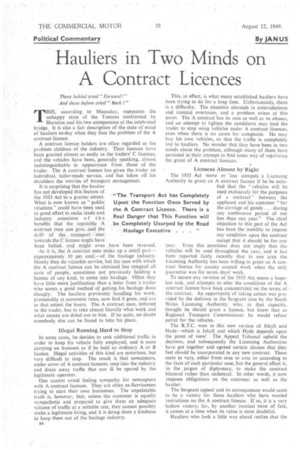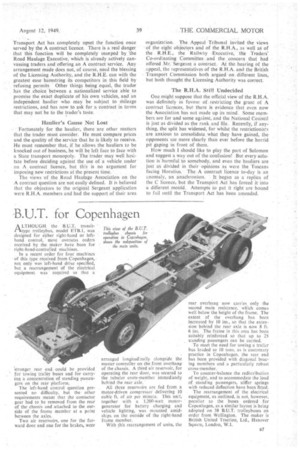Hauliers in Two Minds on A Contract Licences
Page 40

Page 41

If you've noticed an error in this article please click here to report it so we can fix it.
Those behind cried " Forward!" And those before cried " Back !" THIS, according to Macaulay, represents the unhappy state of the Tuscans confronted by Horatius and his two companions at the celebrated bridge. It is also a fair description of the state of mind of hauliers to-day when they face the problem of the A contract licence.
A contract licence holders are often regarded as the problem children of the industry. Their licences have been granted almost as easily as the traders' C licences, and the vehicles have been, generally speaking, almost indistinguishable in appearance from, those of the trader. The A contract licence has given the trader an individual, tailor-made service, and has taken off his shoulders the worries of transport management.
It is surprising that the haulier has not developed this feature of the 1933 Act to a greater extent. What is now known as "public relations" could have been used to good effect to make trade and industry conscious of the benefits that the reputable A Contract man can give:and the drift of the transport --user towards,the.0 licence might have been halted, and .1-night even have been .reversed. -As it is, the A contract men make up a small part— approximately. .10 •pet cent.---of the haulage industry. Mostly they do valuable service, but the ease with which. the A contract licence can be obtained has tempted all sorts of people, sometimes not previously holding a licence of any kind, to come into haulage. Open they have little more justification than a letter from a trader N.,,ho scents a good method of getting:his haulage done cheaply. The hauliers previously handling his work, presumably at economic rates, now find it gone, and are to that extent the losers. The A contract man, tethered to the trader, has to take almost literallY what work and what money are doled out to him. If he quits, no doubt somebody else can he found to take his place.
Haulage Exe
Illegal Running Hard to Stop In some cases, he decides to seek additional traffic in order to keep his vehicle fully employed, and is soon carrying on business as if he held an ordinary A or B licence. Illegal activities of this kind are notorious, but very difficult to stop. The result is that newcomers, under cover of A contract licences, seep.into the industry and drain away traffic that can ill be spared by the legitimate operator.
One cannot avoid feeling sympathy for newcomers with A contract licences. They are often ex-Servicemen trying to start their own businesses. The unpalatable truth is, however, that, unless the customer is equally sympathetic and prepared to give them an adequate volume of traffic at a suitable rate, they cannot possibly make a legitimate living, and it is doing them a kindness to keep them out of the haulage industry.
B6 This, in effect, is what many established hauliers have been trying to do for a long time. Unfortunately, there is a difficulty. The situation abounds in contradictions and ironical overtones, and a problem arises at this point The A contract has its uses as well as its abuses, and an attempt to tighten the conditions may lead the trader to stop using vehicles under A contract licences, even when there is no cause for complaint. He may buy his own vehicles, so that the traffic is completely lost to hauliers. No wonder that they have been in two minds about the problem, although many of them have persisted in their attempt to find some way of regulating the grant of A contract licences.
Licences Almost by Right The 1933 Act more or less compels a Licensing Authority to grant an A contract licence if he be satisfied that the "vehicles will be used exclusively for the purposes of a contract" between the applicant and his customer "for the carriage of goods ... during any continuous period of not less than one year." The chief objection to this part of the Act has been the inability to impose any condition upon the contract except that it should be for one year. Even this provision does not imply that the vehicles will be used throughout the year, and it has been reported fairly recently that in one area the Licensing Authority has been willing to grant an A contract licence for county council work when the only guarantee was for seven days' work.
To secure any revision of the 1933 Act seems a hopeless task, and attempts to' alter the conditions of the A contract licence have been concentrated on the terms of the contract. An opportunity of taking action was provided by the decision in the Sergeant case by the South Wales Licensing Authority, who, in that capacity, thought he should grant a licence, but knew that as Regional Transport Commissioner he would refuse petrol for the vehicles. • The R.T.C. won in this new version of Jekyll and Hyde—which is Jekyll and which Hyde depends upon the point of 'view! • The 'Appeal Tribunal upheld the decision, and subsequently the Licensing 'Authorities have got together and agreed' certain clauses that they feel should be incorporated in any new contract. These seem to vary, either from area to area or according to the facts of each particular case, but the general effect is, in the jargon of diplomacy, to make the contract bilateral rather than unilateral. In other words, it now imposes obligations on the customer as well as the ha ulier.
The Sergeant appeal and its consequences would seem to be a victory for those hauliers who have wanted restrictions on the A contract licence. If so, it is a very hollow victory, for, by another ironical twist of fate, it comes at a time when its value is most doubtful.
Hauliers who look a little way ahead realize that the cutive . • "
Transport Act has completely upset the function once served by the A contract licence. There is a real danger that this function will be completely usurped by The Road Haulage Executive:which is already actively canvassing traders and offering an A contract service. Any arrangement made does not, of COlITS, need the blessing of the Licensing Authority, and the R.H.E. can with the greatest easehamstring its competitors in this field by refusing permits Other things being equal, the trader has the choice between a nationalized service able to promise the exact duplicate of his own vehicles, and an independent haulier who may be subject to mileage restrictions, and has now to ask for a contract in terms that may not be to the trader's taste.
Haulier's Cause Not Lost
. Fortunately for the haulier, there are other matters that the trader must consider. He must compareprices and the quality of the service that he is likely to receive. He most remember that, if he allows the hauliers to be knocked out of business, he will be left fare to face with a State transport monopoly. The trader. may well hesitate before deciding against the use of a vehicle under an A contract licence, but this is no argument for imposing new restrictions at the present time.
The views of the Road Haulage Association on the A contract question are not easily defined. It is believed that the objectors to the original Sergeant, application were R.H.A. members and had the support of their area
organization. The Appeal Tribunal invited the views of the eight objectors.and of the R.H.A., as Well ai of the R.H.E., the Railway .Executive,. the Traders' Co-ordinating Committee.: and the concern that had offered Mr: Sergeant a contract. At the.hearing of the appeal, the representatives of the R.H.A. and the British Transport Commission both argued on . different lines, but both thought the Licensing Authority was correct.
The R.H.A, Still Undecided
One might suppose that the official view of the R.H.A. was definitely in favour of .restricting the grant of A contract licences, but there is evidence that even now the Association has not made up its mind. Some members are for and some against, and the National Cotineil is just as divided as the rank and file. Recently, if anything, the split has widened, for whilst the restrictionists are anxious to consolidate what they have gained, the opponents see more clearly than ever before the horrid pit gaping in front Of them.
How much I should like to play the part of Solomon and suggest a way out of the confusion! But every solution is harmful to somebody, and even the hauliers are just as divided in their opinions as were the Tuscans facing Eloratius. The A contract licence to-day is an anomalY, an anachronism. It began as a. replica of the C licence, but the Transport Act has forced itinto a different mould. Attempts to put it right are bound to fail until the Transport Act has been amended.




















































































